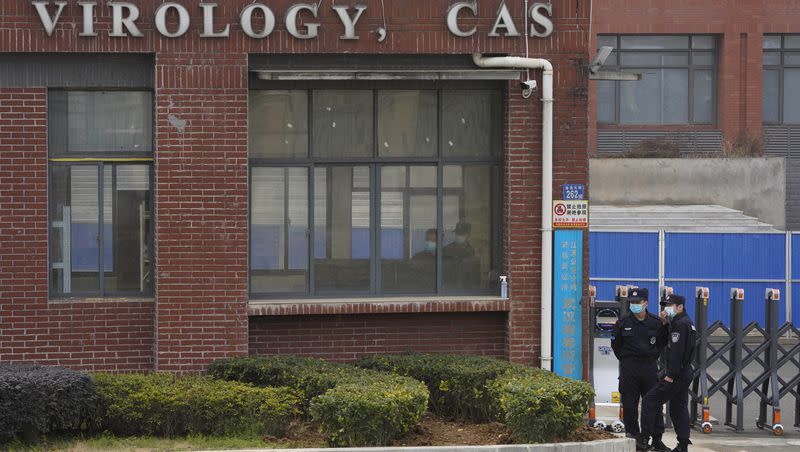Utah congressman accuses intelligence agencies of being ‘afraid of confronting China’ over COVID-19 origins

- Oops!Something went wrong.Please try again later.
- Oops!Something went wrong.Please try again later.
The House and the Senate voted unanimously last week to require the Biden administration to declassify intelligence related to the origins of the COVID-19 virus and any information related to a possible lab leak at the Wuhan Institute of Virology in China. President Joe Biden told the press he hasn’t made a decision yet on whether to sign or veto the legislation.
Utah Republican Rep. Chris Stewart told the Deseret News he believes the investigation into the origins of COVID have taken this long partly because the U.S. intelligence agencies were “afraid of confronting China.”
“Early in the pandemic, it became apparent that we had a problem,” Stewart said.
He reluctantly agreed with the assessment of former House Intelligence Committee chair Rep. Adam Schiff, D-Calif., when he said last year that the agencies were inadequately prepared for the pandemic.
Having sat on the Intelligence Committee since 2015, Stewart said the agencies were slow to shift assets to confront the question of where SARS-CoV-2 came from. He said agencies briefed him and others on the origins of the pandemic in a classified briefing in Congress’ sensitive compartmented information facility (SCIF).
“In April 2020, two or three months into the pandemic, I was down in the SCIF and they said they had concluded that ‘the virus had come from a natural source,’” he said.
Stewart said he responded incredulously, saying, “you don’t know that yet, none of us know that yet.”
Since then he said he’s concluded not only that the intelligence community was inadequately prepared for the pandemic, but he has questioned whether “they were ready institutionally to tell us the truth.”
“The reality is they were so afraid of confronting China or presenting a situation where we had to confront China that they instead defaulted to the easier solution of just saying, ‘we think it came from a natural source,’” he said. “Rather than saying, ‘yes, it came from China and 7 million people around the world are going to die, and China is probably responsible for it in some way.’”
Related
Congress investigates COVID-19 lab leak theory, Utah congressmen weigh in
There’s more evidence that COVID-19 started in a lab, expert says
Early in 2021, Biden asked U.S. intelligence agencies to look into how the pandemic got its start.
One agency said it believed the virus originated from a human infection at a research lab, while four other federal agencies reported they believed it emerged naturally. The declassified report released in August 2021 did not name the agencies.
Last month the Department of Energy and the Federal Bureau of Investigation reported that they favor the lab leak theory now over a natural genesis. The Wall Street Journal reported this was an update from their previous position in 2021.
Democrats’ change of heart
Stewart and GOP House leadership have long called for the declassifying of intelligence related to COVID-19 but faced stonewalling from the president and their Democratic colleagues.
He said his conversations with his fellow members of Congress across the aisle have centered around the “truth,” and that there’s little reason to withhold the information.
The prospect of a presidential veto is confusing to political observers. The White House Press Secretary deflected when asked by a Washington Post reporter on whether Biden planned to sign or veto the legislation. But she did say the president believes it is “important to get to the bottom of COVID origins.”
A president has the power to declassify intelligence at anytime. Stewart said he believes if Biden issues a veto, it would make him look weak and in conflict with his own party.
Is Dr. Anthony Fauci responsible?
Stewart told the Deseret News that Dr. Anthony Fauci, former head of the National Institute of Allergy and Infectious Diseases and part of the White House Coronavirus Task Force, should support transparency.
At a House hearing last week, witnesses and members of Congress made allegations that Fauci purposefully misled Americans on the origins of COVID-19. He supposedly steered his colleagues and Congress toward the natural evolution origins theory, according to Republican witnesses, even though there was some evidence at the time the virus might have leaked from the the research lab in Wuhan.
Asked if Fauci should be held responsible if it’s proven he purposely misled Americans, Stewart said, “Yes, there’s no question about it.”
“There may or may not be a criminal statute against misleading the American people, but there is for misleading Congress,” he said. “Obstruction of our own investigation is every bit as unacceptable as any deception.”
Related
What happens next?
If the bill becomes law, the legislation requires the Director of National Intelligence to declassify information related to the lab and release it to the public within 90 days.
The legislation states releasing the information is “critical for preventing a similar pandemic from occurring in the future.” This sentiment has been echoed by many in both parties in Congress.
The bill also requires all intelligence on connections between the research lab and the Chinese military to be declassified. Stewart said this line was included not to signify Congress’ suspicion that the virus was designed as a bioweapon. He hasn’t seen any evidence to suspect any malevolent action.
Instead, he said he wants to show the American people that all information is being declassified so no one can reasonably speculate. “It’s better for us just to declassify all of it and put it all on the table so everyone’s questions can be answered,” he said.
Biden has 10 days, excluding Sunday, from the passing of the legislation out of Congress last Friday to either veto, sign or allow it to become law without his signature.
Stewart doesn’t expect him to veto it, but said if he does he’ll be interested to hear his explanation.

